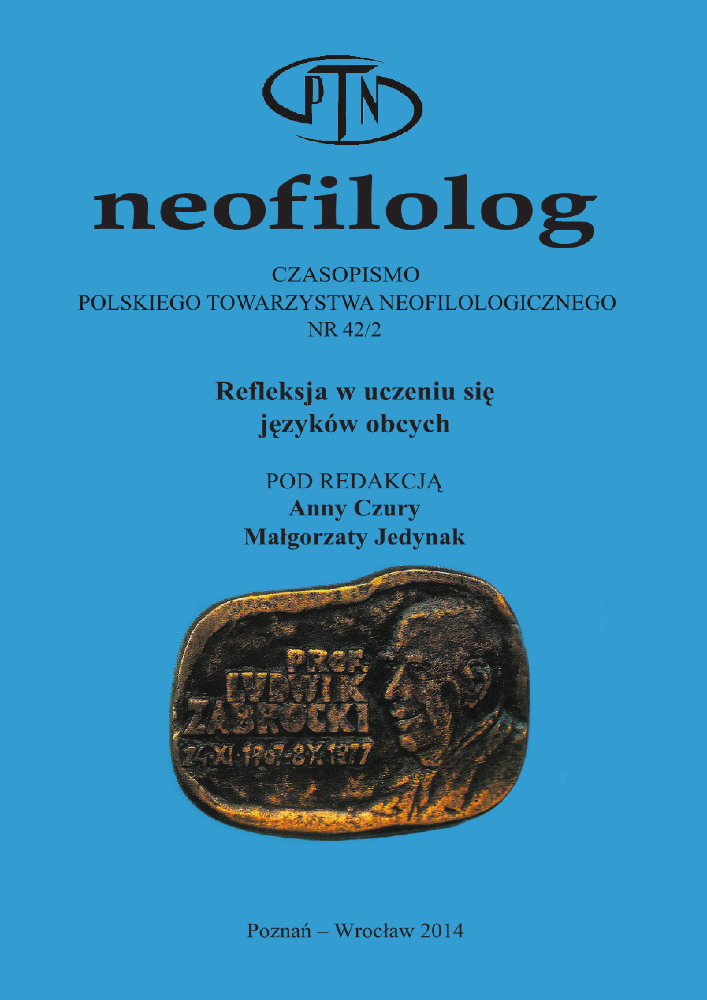Résumé
Building learner autonomy requires effective communication and cooperation between teachers and students with regard to teaching/learning goals and methods. In addition, critical reflection on the progress being made is needed. This paper aims to represent the voices on one side of this dialogue, by investigating the perceptions that Business English students at the University of Economics in Katowice have of the roles which ESP teachers should take. This study into learner autonomy sees the co-responsibility of learners for the outcomes of the teaching/learning process as a significant determinant of the development of autonomy. Besides providing an interesting insight into the needs and expectations of Business English students, the results may contribute to the discussion on the benefits of and problems related to the development of autonomy among young adults in tertiary education.Références
Bhatia, V. K. 2004. Worlds of Written Discourse. London/New York: Continuum.
Benson, P. 1997. „The philosophy and politics of learner autonomy” (w:) Autonomy and Independence in Language Learning. (red. P. Benson, P. Voller). London: Longman: 18-27.
Benson, P. 2001. Teaching and Researching Autonomy in Language Learning. Harlow: Pearson Education.
Billington, D. D. 2000. Seven Characteristics of Highly Effective Adult Learning Programs. New Horizons for Learning. Seattle: New Horizons. www.newhorizons.org.
Chan, V. 2001. „Readiness for learner autonomy: what do our learners tell us?” Teaching in Higher Education 6(4): 505-519.
Dickinson, L. 1995. „Autonomy and motivation: A literature review”. System 23(2): 165-174.
Dudley-Evans, T., St John, M. J. 1998. Developments in ESP. A Multi-Disciplinary Approach. Cambridge: Cambridge University Press.
Holec, H. 1981. Autonomy and Foreign Language Learning. Oxford: Pergamon.
Hutchinson, T., Waters, A. 1987. English for Specific Purposes. A Learning-Centred Approach. Cambridge: Cambridge University Press.
Kierczak A. W., Sitko, A. 2004. „Autonomia ucznia a nauczanie języka specjalistycznego, czyli czy wprowadzać autonomię na lektoratach?” (w:) Autonomia w nauce języka obcego. (red. M. Pawlak). Poznań-Kalisz: Wydawnictwo UAM: 149-159.
Komorowska, H. 2002. Metodyka nauczania języków obcych. Warszawa: Fraszka Edukacyjna.
Little, D. 1991. Learner Autonomy 1: Definitions, Issues and Problems. Dublin: Authentik.
Little, D. 1995. „Learning as dialogue: The dependence of learner autonomy on teacher autonomy”. System 23(5): 175-182.
Littlejohn, A. 1985. „Learner choice in language study”. ELT Journal 39(4): 253-261.
Li, X. 2012. „The application of learner autonomy theory and model into ESP technology-assisted curriculum construction”. International Journal of English Linguistics 2(5): 94-100.
Michońska-Stadnik, A. 2004. „Autonomia ucznia 400 lat po Galileuszu, czyli szansa dla odpowiedzialnych” (w:) Autonomia w nauce języka obcego. (red. M. Pawlak). Poznań-Kalisz: Wydawnictwo UAM: 11-18.
Nunan, D. 1996. „Towards autonomous learning: Some theoretical, empirical and practical issues” (w:) Taking Control: Autonomy in Language Learning. (red. R. Pemberton, E.S.L. Li, W.W.F. Or, H. Pierson). Hong Kong: Hong Kong University Press: 13-26.
Pawlak, M. 2004. „Autonomia studenta anglistyki – deklaracje a rzeczywistość” (w:) Autonomia w nauce języka obcego. (red. M. Pawlak). Poznań-Kalisz: Wydawnictwo UAM: 173-191.
Sobkowiak, P. 2003. „Studium przypadku w dydaktyce języków obcych dla celów specjalnych”. Języki Obce w Szkole 4: 7-12.
Sobkowiak, P. 2008. Issues in ESP: Designing a Model for Teaching English for Business Purposes. Poznań: Wydawnictwo Naukowe UAM.
Surdyk, A. 2005. „Postawy uczących się w dydaktyce języków obcych w ujęciu autonomizującym” (w:) Nauka języków obcych w dobie integracji europejskiej. (red. K. Karpińska-Szaj). Łask: Oficyna Wydawnicza LEKSEM: 299-311.
Turula, A. 2004. „Czy warto siać? – autonomia na kursach językowych dla dorosłych” (w:) Autonomia w nauce języka obcego. (red. M. Pawlak). Poznań-Kalisz: Wydawnictwo UAM: 285-289.
Voller, P. 1997. „Does the teacher have a role in autonomous language learning?” (w:) Autonomy and Independence in Language Learning. (red. P. Benson, P. Voller). London: Longman: 98-113.
Wilczyńska, W. 1999. Uczyć się czy być nauczanym. O autonomii w przyswajaniu języka obcego. Warszawa/Poznań: Wydawnictwo Naukowe PWN.
Wilczyńska, W. 2002. „Podmiotowość i autonomia jako wyznaczniki osobistej kompetencji komunikacyjnej” (w:) Autonomizacja w dydaktyce języków obcych. Doskonalenie się w komunikacji ustnej. (red. W. Wilczyńska). Poznań: Wydawnictwo Naukowe UAM: 51-67.
Licence
© Jolanta Łącka-Badura, Magdalena Łęska 2019

Ce travail est disponible sous licence Creative Commons Attribution - Pas de Modification 4.0 International.
Auteurs :
Les auteurs de textes acceptés pour publication dans la revue Neofilolog sont tenus de remplir, signer et renvoyer à l'adresse de la rédaction, un accord sur l'octroi d'une licence gratuite pour les œuvres, avec obligation d'accorder une sous-licence CC.
En vertu de cet accord, les auteurs des textes publiés dans la revue Neofilolog accordent à l'Université Adam Mickiewicz de Poznań une licence non exclusive et gratuite et permettent l'utilisation de la sous-licence Creative Commons Attribution-NoDerivatives 4.0 International (CC BY-ND 4.0).
Les auteurs se réservent le droit de disposer librement de l'œuvre.
Utilisateurs :
Les utilisateurs d'Internet intéressés ont le droit d'utiliser les œuvres publiées à partir de l'année 2017 sous réserve des conditions suivantes :
- reconnaissance de la qualité d'auteur - l'obligation de fournir des informations sur la qualité d'auteur, le titre, la source (liens vers l'œuvre originale, DOI) et la licence, ainsi que l'œuvre distribuée ;
- sans créer d'œuvres dérivées - l'œuvre doit être conservée dans sa forme originale, p. ex. les traductions ou les interprétations ne peuvent être distribuées sans le consentement de l'auteur.
Tous les textes publiés sont soumis au droit d'auteur.
Autres :
L'Université Adam Mickiewicz de Poznań se réserve le droit à la revue dans son ensemble (mise en page, forme graphique, titre, conception de la couverture, logo, etc.).
.
